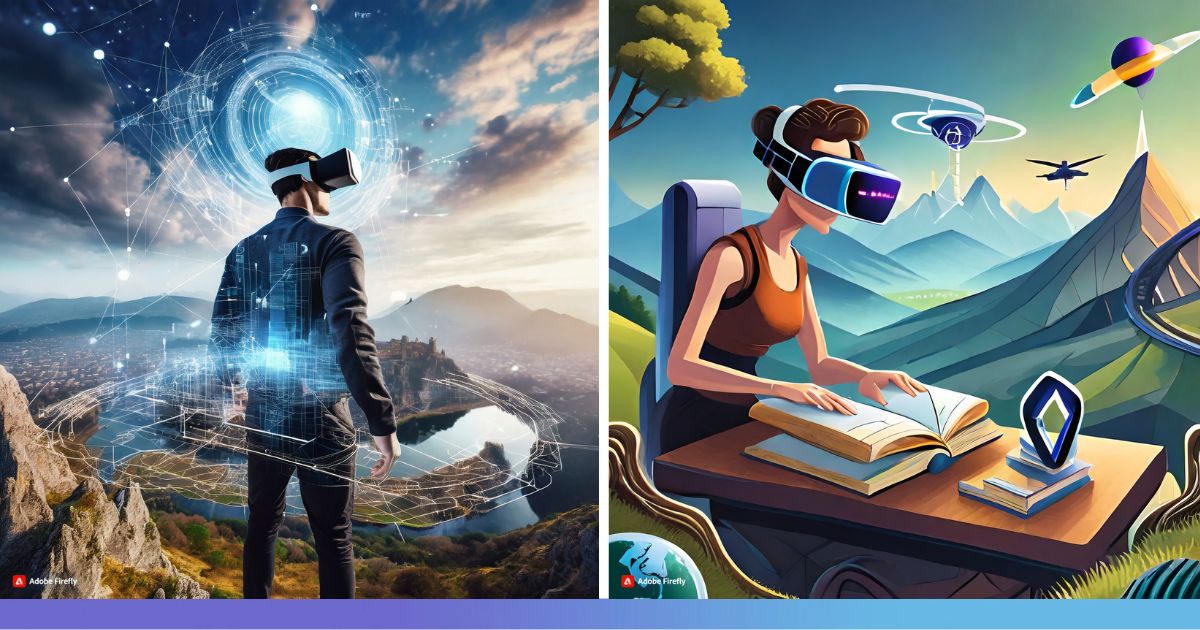In a rapidly evolving educational landscape, the convergence of cutting-edge technologies like augmented reality (AR), virtual reality (VR), and blockchain is reshaping the way we approach learning. The emergence of the metaverse is not only expanding the horizons of formal education but is also revolutionizing workplace training. Let’s delve into the transformative impact of these future internet technologies on both formal education and professional development.
How the Future Internet Enhances Formal Education:
Traditional classrooms are undergoing a metamorphosis as educational institutions increasingly embrace the metaverse. Within virtual reality environments, students are no longer confined to textbooks; they can actively engage with their surroundings, collaborate on projects, and embark on virtual field trips. Platforms like Labster offer over 250 virtual lab simulations, providing students with a safe yet immersive space to conduct a wide array of experiments.
Augmented reality adds another layer to the learning experience by overlaying digital elements onto real-world objects. Froggipedia, for instance, guides students through the intricacies of studying the internal organs of a frog without the need for physical dissection. Research indicates that experiential learning can boost knowledge retention by up to 90%, making immersive experiences pivotal in fostering a deeper understanding of complex concepts.
Transforming Workplace Training:
Beyond traditional education, businesses are leveraging the power of the metaverse to revolutionize employee training. Realistic simulations within virtual environments offer hands-on experiences without the constraints of physical locations or materials. This approach is particularly beneficial for high-risk professions, such as firefighter or law enforcement training, where immersive scenarios help employees retain information more effectively than traditional methods.
Major corporations, like BP, are partnering with technology firms such as Igloo Vision to create detailed virtual replicas for employee training. By providing a safe and controlled environment, these simulations allow workers to practice critical tasks and enhance their skills without exposure to real-world risks.
Blockchain’s Role in Securing Educational Data:
Blockchain technology is poised to play a crucial role in securing educational data. Educational institutions can use blockchain to create an encrypted digital ledger, safeguarding student records, course materials, transcripts, and other sensitive documents. This ensures that only authorized personnel have access to critical information, protecting it from potential security threats.
Looking ahead, blockchain has the potential to streamline administrative processes through smart contracts. Tasks like enrolling new students or transferring credits between universities could become more efficient, contributing to a seamless and secure educational ecosystem.
Moving Learning Into the Future:
The metaverse and its associated technologies are at the forefront of reshaping education. From augmented and virtual reality to the security provided by blockchain, these tools are ushering in a new era of interactive and immersive learning experiences. As we make strides toward this educational transformation, collaboration among educators, businesses, governments, and technology experts will be crucial for a successful transition into a hybrid format where learning seamlessly occurs in both virtual environments and traditional classrooms. The future of education is undeniably dynamic, embracing innovation to create a more engaging and effective learning landscape.
Also Read: Striking A Harmonious Chord: The Crucial Need For Balancing Work & Life

